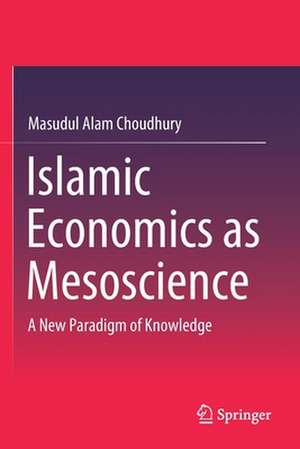Islamic Economics as Mesoscience: A New Paradigm of Knowledge
Autor Masudul Alam Choudhuryen Limba Engleză Paperback – 25 noi 2021
| Toate formatele și edițiile | Preț | Express |
|---|---|---|
| Paperback (1) | 557.46 lei 38-44 zile | |
| Springer Nature Singapore – 25 noi 2021 | 557.46 lei 38-44 zile | |
| Hardback (1) | 644.82 lei 6-8 săpt. | |
| Springer Nature Singapore – 25 noi 2020 | 644.82 lei 6-8 săpt. |
Preț: 557.46 lei
Preț vechi: 696.82 lei
-20% Nou
Puncte Express: 836
Preț estimativ în valută:
106.68€ • 110.97$ • 88.07£
106.68€ • 110.97$ • 88.07£
Carte tipărită la comandă
Livrare economică 10-16 aprilie
Preluare comenzi: 021 569.72.76
Specificații
ISBN-13: 9789811560569
ISBN-10: 9811560560
Pagini: 230
Ilustrații: XXV, 230 p. 30 illus., 21 illus. in color.
Dimensiuni: 155 x 235 mm
Greutate: 0.37 kg
Ediția:1st ed. 2020
Editura: Springer Nature Singapore
Colecția Springer
Locul publicării:Singapore, Singapore
ISBN-10: 9811560560
Pagini: 230
Ilustrații: XXV, 230 p. 30 illus., 21 illus. in color.
Dimensiuni: 155 x 235 mm
Greutate: 0.37 kg
Ediția:1st ed. 2020
Editura: Springer Nature Singapore
Colecția Springer
Locul publicării:Singapore, Singapore
Cuprins
Chapter 1: Epistemic and Economics.-Chapter 2: Ontological Foundation Of The Theory of Econometrics In Unity Of Knowledge By Inter-Causality.-Chapter 3: Profit-Sharing versus Interest Avoidance, a Critical Inquiry.-Chapter 4: Content Approach To Analytics Of Islamic Banks By Meso-Economics Of Inter-Causality.-Chapter 5: Objective Functions Of Islamic Bank Bangladesh, A Critique Of Islamic Economics.-Chapter 6: The Meso-Economics Of The Wellbeing Criterion.- Chapter 7: Imaging The Imaginary Events In Evolutionary Learning Trajectories Of Wellbeing.- Chapter 8: Meso-economic framework of decision-making.-Chapter 9: Endogenous monetary transmission model by meso-economics, by Masudul A. Choudhury & Nirdukita Ratnawaty.- Chapter 10: Money, debt, interest, and real economy.- Chapter 11: Spatial Domain Analysis as an evaluation method of meso-economic model, by Mohammad Shahadat Hossain (contribution).
Notă biografică
Professor Masudul Alam Choudhury is one of a handful of academic scholars in the field of Islamic studies with a focus on Islamic economics and finance. His work has been highly recognised in both Western and Muslim academic circles. Professor Choudhury obtained his Ph.D. in the field of Human Capital Theory and Economic Growth from the University of Toronto. He is the first academic in his field to address the original methodology of Tawhid as ontological law in the development of a Theory of Meta-Science. Professor Choudhury is the International Chair in the Postgraduate Program in Islamic Economics and Finance at Trisakti University in Jakarta, Indonesia. He teaches and supervises doctoral students, and researches and publishes in the areas of Islamic socio-scientific methodology, shari’ah and economics, and policy-theoretic applications using these foundational areas of Islamic studies. He is a regular Summer Visiting Professor in the Social Economy Center of the Ontario Institutefor Studies in Education, University of Toronto.
Textul de pe ultima copertă
This book presents the building blocks of Islamic economics as meso-science, offering an in-depth study of the Qur’anic worldview of the monotheistic unity of knowledge, which is the universal and unique message of Tawhid in the Qur’an. This primal ontological premise is formalised in an analytical approach that introduces and unpacks the philosophical concepts of ontology, epistemology, and phenomenology in relation to the Tawhidi methodological worldview. The analysis of Qur’anic logical consistency is then cast in a phenomenological perspective by applying the complete model of the unity of knowledge of the Qur’an in a specific study of the Tawhidi methodological approach to Islamic financial-economic theory. In doing so, it tackles the problems of meso-economics given its socio-scientific holism in world affairs. It hones in on the results of the symbiotic modulation of evolutionary learning processes in the world system of the unity of knowledge and its material embedding across knowledge, and knowledge-induced space and time dimensions. The author poses that Shari’ah is only partial in its scope, and excludes an analytical methodological worldview. Shari’ah is thus cast in the midst of a meso-socio-scientific absence of any appertaining methodology. The book is a landmark work in the conceptual and applied understanding of Tawhid as the methodological worldview of the monotheistic unity of knowledge in the meso-socio-scientific realm of ‘everything’, particularised to Islamic economics. Adopting an inter-disciplinary view integrating various fields, it challenges pervasive Western academic and institutional thinking in terms of economics. It will be of interest to students and researchers in Islamic economics, religious theory, Islamic philosophy, development studies, and finance.
Caracteristici
Authored by a pre-eminent author who challenges the assumption that Western economics is secure and that Islamic economics and finance are an integral part of Western economics Presents an essentially new paradigm of thinking and understanding reality in Islamic philosophy Critiques the failure of Shari’ah economics and of traditional Islamic economics and finance to develop a truly modern, efficacious economics capable of solving world problems
